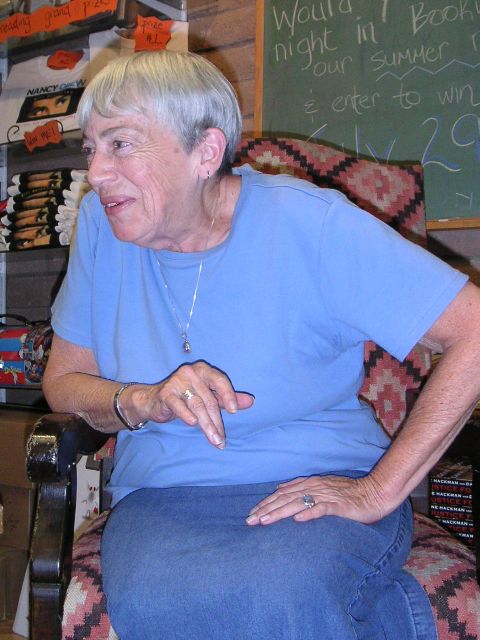Ursula K. Le Guin (October 21, 1929, to January 22, 2018)
“Hard times are coming, when we’ll be wanting the voices of writers who can see alternatives to how we live now, can see through our fear-stricken society and its obsessive technologies to other ways of being, and even imagine real grounds for hope. We’ll need writers who can remember freedom – poets, visionaries – realists of a larger reality.” – From Ursula K. Le Guin’s acceptance speech, National Book Awards, 2014. Source video
I was devastated to learn of the death of author Ursula Kroeber Le Guin yesterday – her writing has profoundly affected my life in so many ways.
I first read her Earthsea Trilogy in high-school, when the struggle waged by Ged against the darkness spoke to me so directly, so seriously and so hopefully that it got me through some very, very hard times. Years later, I had the pleasure of sharing this story with my wonderful daughter, reading aloud in the early morning sunshine while waiting for the school bus. By then, I was on a very different island in the archipelago of my life, in part thanks to the perspectives she taught me to see.
Throughout my life, I have been moved and changed by the words she shared: by her explorations of gender and identity in the Left Hand of Darkness; by her of stories freedom, race and humanity in the Werel novels or the Lathe of Heaven; by the utter importance of words and imagination in her non-fiction compilations such as the Language of the Night; and by her playfulness – one of my favourite sentences begins Always Coming Home: “This is a story about a people who might be going to have lived in Southern California…”.
I love her long fiction. I love her short fiction. I love her poetry and her speeches, her outside perspective and her deep understanding of life. She is my go-to writer when my mind needs a good talking to, a gentle shaking. Though I never had the honour to meet her, my world is diminished without her to share it. For she was very involved in humankind and her eloquence was that of saying the truth.
I see her influence every time a kid in the library asks me “Is it true or is it fiction?” and I respond “It isn’t factual, but it is true”, and in all my best decisions as parent (”To discipline something, in the proper sense of the word, does not mean to repress it, but to train it – to encourage it to grow, and act, and be fruitful”), and in how I mean to grow old.
I will always be grateful for her gifts, from the low stone wall and the addicts of Hort Town to the soaring of the dragons and the words as old as time itself. Some of the person I am will always be because of the person she was.
Thank you, Ursula, for your compassion and unflinching truthfulness and for sharing your boundless talents and vision with me, as with thousands of others. I will miss you.
Book reviews
While I have been savouring her books – by which I mean not devouring them all at once – I have posted only a few reviews of her books in this particular space.
I will post more, since there is only so much time I can allow to elapse before I re-read one of her books.
However, you may be interested by:
- No time to spare (non-fiction)
- The disposessed: An ambiguous utopia (fiction) DC0387
- Dragonfly (a short story in Legends, volume 1 DA20360
- Lavinia (fiction) DA47766
Somehow, I did not publish a review of DA52811, The found and the lost: the collected novellas of Ursula K. Le Guin. I think this is because the audiobook format is difficult to work with unless you are VERY proactive about taking notes, which is difficult since I do most of my reading on public transportation and consistent note-taking is a challenge.
If you have never read her work before, do start with that one: it gives a great overview of her universes, from Earthsea to the Ekumen, and to places in between.
The CELA library also has several collections of her short stories, as well as some longer works. To find them, do an advanced search for “Le guin, Ursula”. Bookshare, of course, has them all.
Or, you can start here:
Or, why not visit the website and blog she started (in her eighties) at http://www.ursulakLeGuin.com/? There, you can read her obituary from the New York Times.
I will miss her honesty, wisdom and courage.
